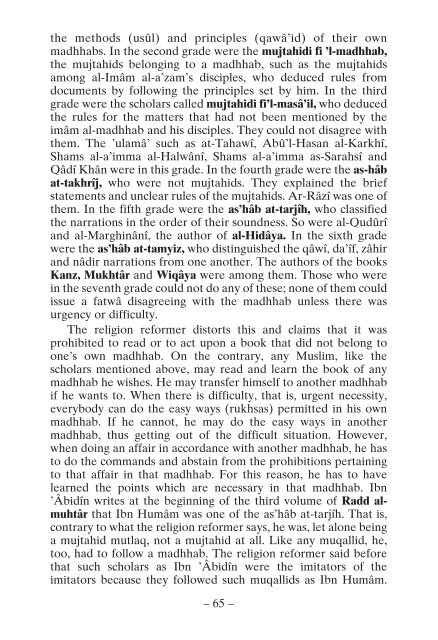Answer to an Enemy of Islam
Answer to an Enemy of Islam This is a refutation of the lies and slanders which the lâ-madhhabî Rashîd Rıdâ of Egypt, who appeared in the disguise of a religious man and wrote against the scholars of Islam in his book Muhâwarât.
Answer to an Enemy of Islam
This is a refutation of the lies and slanders which the lâ-madhhabî Rashîd Rıdâ of Egypt, who appeared in the disguise of a religious man and wrote against the scholars of Islam in his book Muhâwarât.
Create successful ePaper yourself
Turn your PDF publications into a flip-book with our unique Google optimized e-Paper software.
the methods (usûl) <strong>an</strong>d principles (qawâ’id) <strong>of</strong> their own<br />
madhhabs. In the second grade were the mujtahidi fi ’l-madhhab,<br />
the mujtahids belonging <strong>to</strong> a madhhab, such as the mujtahids<br />
among al-Imâm al-a’zam’s disciples, who deduced rules from<br />
documents by following the principles set by him. In the third<br />
grade were the scholars called mujtahidi fi’l-masâ’il, who deduced<br />
the rules for the matters that had not been mentioned by the<br />
imâm al-madhhab <strong>an</strong>d his disciples. They could not disagree with<br />
them. The ’ulamâ’ such as at-Tahawî, Abû’l-Has<strong>an</strong> al-Karkhî,<br />
Shams al-a’imma al-Halwânî, Shams al-a’imma as-Sarahsî <strong>an</strong>d<br />
Qâdî Khân were in this grade. In the fourth grade were the as-hâb<br />
at-takhrîj, who were not mujtahids. They explained the brief<br />
statements <strong>an</strong>d unclear rules <strong>of</strong> the mujtahids. Ar-Râzî was one <strong>of</strong><br />
them. In the fifth grade were the as’hâb at-tarjîh, who classified<br />
the narrations in the order <strong>of</strong> their soundness. So were al-Qudûrî<br />
<strong>an</strong>d al-Marghinânî, the author <strong>of</strong> al-Hidâya. In the sixth grade<br />
were the as’hâb at-tamyiz, who distinguished the qâwî, da’îf, zâhir<br />
<strong>an</strong>d nâdir narrations from one <strong>an</strong>other. The authors <strong>of</strong> the books<br />
K<strong>an</strong>z, Mukhtâr <strong>an</strong>d Wiqâya were among them. Those who were<br />
in the seventh grade could not do <strong>an</strong>y <strong>of</strong> these; none <strong>of</strong> them could<br />
issue a fatwâ disagreeing with the madhhab unless there was<br />
urgency or difficulty.<br />
The religion reformer dis<strong>to</strong>rts this <strong>an</strong>d claims that it was<br />
prohibited <strong>to</strong> read or <strong>to</strong> act upon a book that did not belong <strong>to</strong><br />
one’s own madhhab. On the contrary, <strong>an</strong>y Muslim, like the<br />
scholars mentioned above, may read <strong>an</strong>d learn the book <strong>of</strong> <strong>an</strong>y<br />
madhhab he wishes. He may tr<strong>an</strong>sfer himself <strong>to</strong> <strong>an</strong>other madhhab<br />
if he w<strong>an</strong>ts <strong>to</strong>. When there is difficulty, that is, urgent necessity,<br />
everybody c<strong>an</strong> do the easy ways (rukhsas) permitted in his own<br />
madhhab. If he c<strong>an</strong>not, he may do the easy ways in <strong>an</strong>other<br />
madhhab, thus getting out <strong>of</strong> the difficult situation. However,<br />
when doing <strong>an</strong> affair in accord<strong>an</strong>ce with <strong>an</strong>other madhhab, he has<br />
<strong>to</strong> do the comm<strong>an</strong>ds <strong>an</strong>d abstain from the prohibitions pertaining<br />
<strong>to</strong> that affair in that madhhab. For this reason, he has <strong>to</strong> have<br />
learned the points which are necessary in that madhhab. Ibn<br />
’Âbidîn writes at the beginning <strong>of</strong> the third volume <strong>of</strong> Radd almuhtâr<br />
that Ibn Humâm was one <strong>of</strong> the as’hâb at-tarjîh. That is,<br />
contrary <strong>to</strong> what the religion reformer says, he was, let alone being<br />
a mujtahid mutlaq, not a mujtahid at all. Like <strong>an</strong>y muqallid, he,<br />
<strong>to</strong>o, had <strong>to</strong> follow a madhhab. The religion reformer said before<br />
that such scholars as Ibn ’Âbidîn were the imita<strong>to</strong>rs <strong>of</strong> the<br />
imita<strong>to</strong>rs because they followed such muqallids as Ibn Humâm.<br />
– 65 –

















